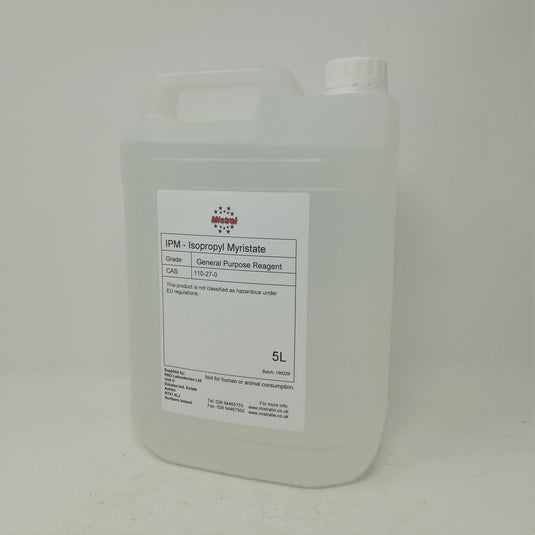Isopropyl Myristate - IPM
iso-Propyl Tetradecanoate
Cosmetic Grade
Isopropyl myristate, also commonly known as IPM is a clear, light yellow liquid which oily in appearance and virtually odourless. It is soluble in most solvents but considered insoluble in water. IPM is manufactured by the esterification of isopropyl alcohol with myristic acid (a fatty acid found in coconut oil and other natural sources).
It is commonly used in various industries, particularly in cosmetics and pharmaceuticals, due to its beneficial properties.
Properties:
- Emollient: Helps to soften and smooth the skin.
- Penetration Enhancer: Facilitates the absorption of other ingredients through the skin.
- Non-Greasy Feel: Provides a lightweight and non-oily texture to formulations.
- Solvent: Can dissolve certain ingredients, improving the formulation and stability of products.
Uses:
-
Cosmetics:
- Moisturizers and Lotions: Enhances skin feel and spreadability.
- Hair Care Products: Used in conditioners and treatments to improve texture.
- Makeup: Incorporated into foundations, powders, and lip products for a smooth application.
-
Pharmaceuticals:
- Topical Medications: Enhances the delivery of active ingredients through the skin.
- Ointments and Creams: Improves consistency and application.
-
Personal Care:
- Deodorants: Acts as a solvent and carrier for active ingredients.
- Sunscreens: Helps distribute UV filters evenly.
-
Other Uses:
- Making Room sprays (see below)
- Industrial Applications: Used as a lubricant and in the formulation of various industrial products.
Functions in Perfumery:
- Carrier and Solvent: IPM can act as a carrier or solvent for fragrance oils, helping to dissolve and distribute the aromatic compounds evenly in the formulation.
- Improved Absorption: It helps in enhancing the absorption of the fragrance into the skin, making the scent more pronounced and long-lasting.
- Non-Greasy Feel: It imparts a lightweight, non-greasy feel, which is desirable for perfumery products applied directly to the skin.
- Stabilization: IPM can help stabilize the fragrance formulation, maintaining its integrity and preventing separation of components.
Applications in Perfumery:
- Perfume Oils: Used as a diluent in perfume oils to make the fragrance more spreadable without altering its scent profile significantly.
- Eau de Toilette and Eau de Parfum: Helps in the formulation of these products by ensuring a smooth application and enhanced fragrance delivery.
- Solid Perfumes: Can be used in solid perfume formulations to improve texture and ease of application.
- Body Sprays and Mists: Included to enhance the feel and performance of the product when sprayed onto the skin.
Benefits:
- Enhances Fragrance Longevity: By improving the absorption into the skin, IPM can help fragrances last longer.
- Improves Skin Feel: Ensures that the product feels pleasant and non-oily upon application.
- Versatile Solvent: Can dissolve a wide range of fragrance oils, making it a flexible ingredient for perfumers.
Applications in Room Sprays:
Why IPM is Used in Room Sprays:
- Solvent: IPM helps dissolve fragrance oils, allowing them to mix well with other solvents or carriers like alcohol or water. It also helps in reducing the greasy feel of some oils.
- Improves Sprayability: It makes the spray apply more evenly, reducing the likelihood of clogging the spray mechanism or leaving residue on surfaces.
- Quick Evaporation: IPM evaporates quickly, helping to disperse the fragrance into the air without lingering residue.
How to Use IPM in Room Sprays:
Ingredients:
- Isopropyl Myristate (IPM): Acts as a carrier solvent.
- Fragrance Oils or Essential Oils: The main scent component.
- Ethanol or Isopropyl Alcohol: Helps with evaporation and solubilizes the oils.
- Distilled Water (Optional): If you’re making a water-based spray.
- Preservatives (Optional): If water is included, you may need a preservative to prevent bacterial growth.
Steps:
-
Mix Fragrance with IPM: Start by combining your fragrance or essential oil with Isopropyl Myristate. The amount of IPM depends on the formulation, but typically, around 5-10% of the total solution is used.
-
Add Alcohol: If you're using alcohol (e.g., ethanol or isopropyl alcohol) as part of the formulation, mix it with the IPM-fragrance blend. The alcohol helps the fragrance evaporate and diffuse more effectively.
-
Blend Thoroughly: Stir the mixture well to ensure all components are fully combined. This step is critical for avoiding separation.
-
Optional: Add Water: If you’re creating a water-based spray, add distilled water to the blend, but ensure you include a preservative to prevent microbial growth.
-
Bottle and Use: Pour the mixture into a fine mist spray bottle. Shake before each use to ensure consistent spraying.
Example Room Spray Formula:
- 70% Ethanol or Isopropyl Alcohol
- 10-15% Fragrance or Essential Oil
- 5-10% Isopropyl Myristate (IPM)
- Water (optional, in case of a lighter spray formulation)
Properties of isopropyl myristate:
- Cas No: 110-27-0
- EINECS No: 203-751-4
- Molecular formula: CH3(CH2)12COOCH(CH3)2
- Appearance: Light yellow / clear oily liquid
- Other names: Tetradecanoic acid, 1-methylethyl ester; Myristic acid isopropyl ester: IPM; propan-2-yl tetradecanoate; Estergel;
- Molecular weight: 270.46
- Acid value: 0.5 max
- Specific gravity: 0.85
- Melting Point: 3-5 oC
- Boiling Point: 167 oC
- Flash Point: 152 oC
- Heavy metal: 0.0005% max
- Insoluble in: Water.
- Soluble in: Most organic solvents
- Refractive index: 1.44
- Vapour pressure: 9.35X10-5 mm Hg at 25 C
Soluble in castor oil, cottonseed oil, acetone, benzene, ether, chloroform, ethyl acetate, ethanol, toluene, and mineral oil; Dissolves many waxes, cholesterol, lanolin. It is practically insoluble in glycerol and propylene glycol
Health & safety
Not a hazardous substance or mixture according to Regulation (EC) No. 1272/2008. This substance is not classified as dangerous according to Directive 67/548/EEC.
PLEASE NOTE: This product is not for human or animal consumption.
